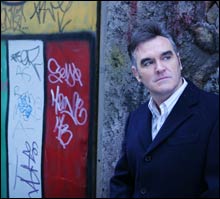 The disappointing thing about Henry Rollins — otherwise a paragon of American manhood — has always been the fact that he is, in public at least, a Moz basher. So tedious, so obvious. Think how interesting it might have been for the singer of In My Head–era Black Flag, peering ember-eyed through ropes of sweaty hair in 1986, to announce a passion for The Queen Is Dead. “Morrissey, man . . . that guy kicks ass,” Rollins could have hissed to a startled interviewer. “You think I’m joking? I’m dead fucking serious. ‘We can go for a walk where it’s quiet and dry, and talk about precious things . . . ’ That’s a heavy fucking line right there. That’s a Mack truck. That’s better than Henry Miller.”
The disappointing thing about Henry Rollins — otherwise a paragon of American manhood — has always been the fact that he is, in public at least, a Moz basher. So tedious, so obvious. Think how interesting it might have been for the singer of In My Head–era Black Flag, peering ember-eyed through ropes of sweaty hair in 1986, to announce a passion for The Queen Is Dead. “Morrissey, man . . . that guy kicks ass,” Rollins could have hissed to a startled interviewer. “You think I’m joking? I’m dead fucking serious. ‘We can go for a walk where it’s quiet and dry, and talk about precious things . . . ’ That’s a heavy fucking line right there. That’s a Mack truck. That’s better than Henry Miller.”
But no. A missed opportunity. Instead there have been hog-like guffaws at Morrissey’s fancy shirts and floppy dancing, his dreary singing voice and effluvium of rained-on Englishness, blah, blah. Rollins, in other words, failed the Morrissey Test. Faced with this silken, flower-tossing, winking-nippled man, some tremor in his libido prevented him from recognizing a fellow mocker and hater, a proper ex-punk with a depression quite as muscular as his own.
In a way Rollins can be forgiven: nothing in his culture had prepared him for the Moz. Even in Britain, where industrial-strength exoticism paraded weekly for the kids on the TV show Top of the Pops, the first public sightings of Morrissey, singing “This Charming Man” with his deaf aid and his gladioli, were a shock. There was something outrageous, appalling even, in those wavy, post-erotic dance moves, the shaking-out of the long limbs as if after a protracted hibernation — it appeared to be a state of inwardness exteriorized, what the soul of a very shy person might look like. He wilted and he tumesced, all at the same time. And then the personage itself: that challenging chin, the face with its vulpine intelligence beneath the magnificent query of a quiff. “Punctured bicycle, on a hillside desolate/Will Nature make a man of me yet?” — a physical detail, earthbound misery, followed by an upward swoop into Thought and Longing, all bedded in the beautiful Marr chords. What a popstar. What a band.
Mark Simpson, for one, was in love. “Petals were raining everywhere, like fairy dust, like free drugs, like jism, like poison. . . . I was alone with this man for less time than it takes to boil an egg. But he knew what was doing all right, and he made sure it was two and a half minutes I would never get over.” So the author of Saint Morrissey (Touchstone/Simon & Schuster) describes his first exposure to the Smiths on TV. The book is subtitled, with some accuracy, A Portrait of This Charming Man by an Alarming Fan. Deflowered (in a pop sense) by the flower king, teenage Simpson became a Moz maniac. The great suffering that ensued is our good fortune, because SaintMorrissey is a cracking read, almost an instructional handbook on how to develop, deal with, and finally escape an obsession.